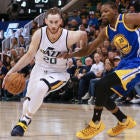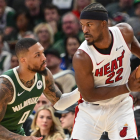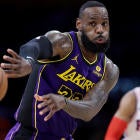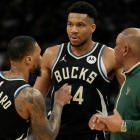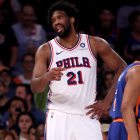The Golden State Warriors completed their sweep of the Utah Jazz with a 121-95 victory in Game 4 of their second-round series on Monday. For the Jazz, this is the end of their best season since Jerry Sloan was in charge, and it could also be the first of many playoff appearances for this core.
Utah was good enough to make the playoffs in 2015-16, but finished 40-42 mostly because its players kept getting hurt. The injury bug didn't disappear in 2016-17, but the Jazz were better equipped to handle it. They won 51 games, thanks to an elite defense and massive improvement from their two best players, Gordon Hayward and Rudy Gobert. There is a lot to be excited about in Salt Lake City, but the franchise now faces its most significant summer in some time.
Five questions about Utah before free agency determines what's next:
1. Was the season a success?
Unequivocally. The Jazz would have liked to take a game from the Warriors, of course, but they accomplished their goal of making the playoffs, came close to having home-court advantage in the first round and beat the Los Angeles Clippers in a mild upset, winning Game 7 on the road. After years of collecting young talent, the results were finally there. The front office's plan to surround their young players with versatile veterans worked just about perfectly.
Hayward eliminated any skepticism about whether he could be a true No. 1 option, and he became an excellent defender, too. He made his first All-Star appearance, became more ball-dominant and more efficient, leaving no doubts about whether or not he is worth the maximum contract coming his way in July. Gobert, meanwhile, anchored Utah's awesome defense and turned into a devastating finisher out of the pick-and-roll.
The crazy thing about the Jazz's season is that it felt like they took a massive step forward, but they could have been even better with a little luck. George Hill, who missed their last three games against the Warriors, only played 49 games in the regular season. Derrick Favors missed 32 games and spent most of the other 50 playing through pain. Rodney Hood missed 23 games, too. Utah's starting five was almost never intact, and it still had the fifth-best net rating in the league.
2. What happens with Hayward this summer?
You'd think that the Jazz would be the favorites to sign him. Hayward is beloved in Utah, and the organization has done its best to provide him with an attractive situation. Coach Quin Snyder is a keeper, and the organization has surrounded Hayward with players who can grow with him. There might be other intriguing teams, but it's hard to see another situation where he can remain the undisputed leader of his team while also having a supporting cast like this.
Hayward, though, has evolved into the kind of player that will receive a max offer from just about every organization that can give him one. The Boston Celtics have been linked to him for years, mostly because Brad Stevens coached him at Butler. He would be amazing in that system, but Boston would have to shed a bunch of salary in order to sign him.
3. Why else is this summer so important?
Since the Jazz failed to work out an extension with Hill, he will be an unrestricted free agent. They were a different team this season when he was healthy, and you'd have a tough time designing a point guard who fits better with their personnel. Utah wanted him for a while, and it surrendered a lottery pick to acquire him. The market, though, could put general manager Dennis Lindsey in an uncomfortable position.
Joe Ingles, a vital part of the Jazz's rotation all season, might have played his way out of their price range in the playoffs. Everybody wants 3-and-D guys who can pass the ball, and Ingles showed on a big stage how much his specific skill set helped his team. He's a restricted free agent, so the ball will be in Utah's court, but it will also have to make a few other calculations.
Hood and Dante Exum will be eligible for extensions on their rookie contracts. Management will also need to figure out what it thinks about Favors and how he fits next to Gobert. Next year will be a contract season for the big man, so this is the time to trade him if the Jazz don't think they'll be ready to pay him when the time comes.
4. How much better can this team be?
If Hayward and Hill stay, it's not crazy to think Utah could be the second-best team in the West next season. The Clippers series provided a glimpse of how dangerous it can be, but even that was incomplete because of how much time Gobert missed.
The Jazz have an identity. They slow things down, play physical defense and pass the ball more than any other team. The room for improvement comes on the offensive end -- they were 12th in offensive rating during the regular season, and they could use some more firepower.
The good news here is that Hayward and Gobert are still years away from their primes. The development of Exum and forward Trey Lyles could raise this team's ceiling, and there's still the matter of what happens with Alec Burks, who was once a nice weapon but hasn't been healthy for the last three seasons.
5. What's the worst-case scenario?
Hayward leaving would be a full-fledged disaster, and it would be even worse if Hill walked, too. That would leave Utah with a decent roster, but it would be extremely limited on offense.
In this scenario, Gobert would become the franchise centerpiece and the team would have to see how much extra playmaking responsibility Hood could handle. Exum would also be thrust into a bigger role. Essentially, the Jazz would be back where they were a few years ago, except with fewer players on rookie contracts and no lottery pick.













